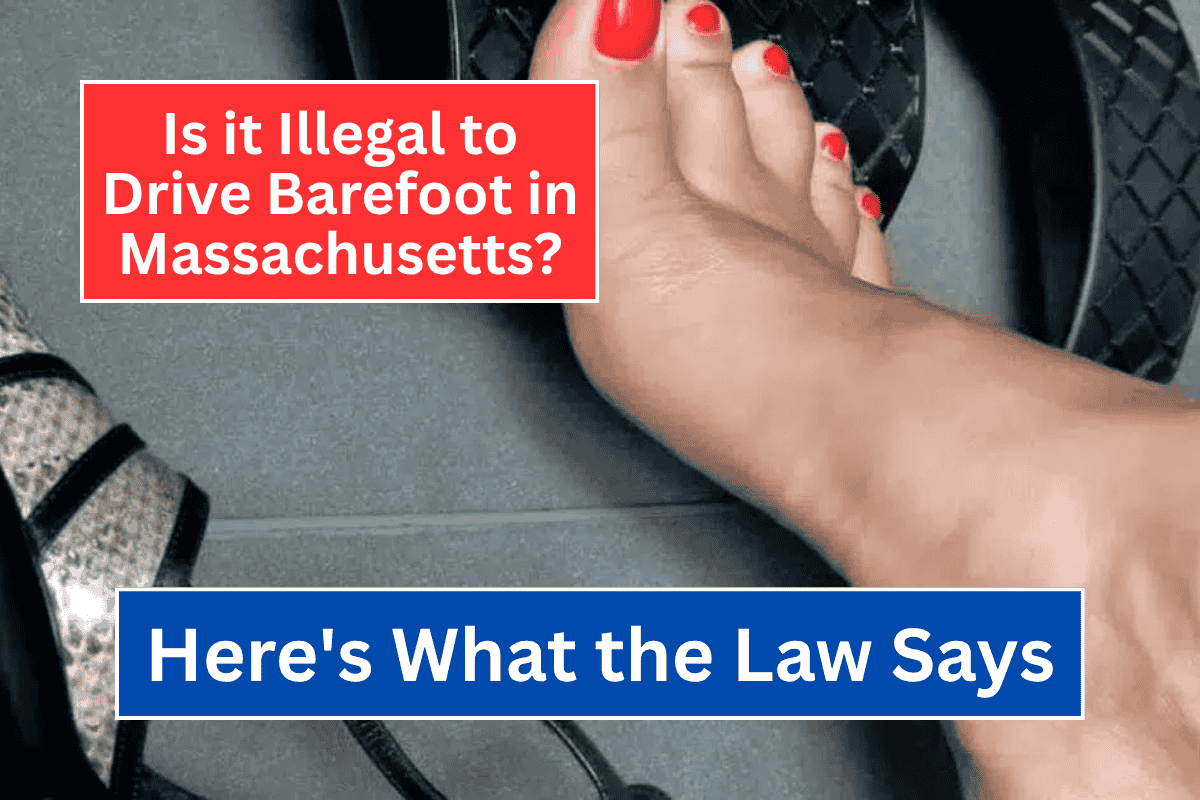If you’ve ever wondered whether it’s illegal to drive barefoot in Massachusetts, you’re not alone. This topic often sparks debate among drivers, some of whom believe it could lead to fines or accidents, while others feel that driving barefoot offers better control over the pedals.
So, what does the law actually say? Here’s what you need to know about driving barefoot in Massachusetts as of 2025.
Massachusetts Law on Barefoot Driving
In Massachusetts, it is not illegal to drive barefoot. There is no specific law that prohibits driving a car without shoes. Unlike some other states that might impose restrictions or fines for driving barefoot, Massachusetts does not have such laws in place.
However, while it’s legal to drive barefoot, it’s important to keep in mind that it may not always be the safest choice. Although the law doesn’t forbid it, your safety is still a priority when behind the wheel.
Why Might Driving Barefoot Not Be Ideal?
Even though driving barefoot is allowed in Massachusetts, it can pose some potential risks:
Slippery Pedals: Without the friction from shoes, it can be harder to maintain a firm grip on the pedals, especially if your feet are wet or if you’re driving in rainy conditions. A foot slip could lead to an accident, particularly if you can’t brake in time.
Reduced Control: Shoes like flip-flops, high heels, or boots can also interfere with your control of the vehicle, but they generally provide better grip than bare feet. For instance, high heels can make it difficult to apply the correct amount of pressure to the gas or brake pedals, which could lead to unsafe driving.
Distractions: When you’re barefoot, it’s easier for your foot to slide off the pedal, or your foot might get caught between the pedal and the floor of the car. These distractions can impair your driving and could potentially lead to an accident.
While many argue that driving barefoot gives them a more direct feel for the pedals, it’s important to weigh that against the risks of slipping and losing control.
What About Other Footwear?
If you’re choosing between barefoot driving and wearing certain types of footwear, you might want to rethink some options:
Flip Flops: These are particularly problematic for driving. They can slip off your feet while you’re driving, or get caught between the pedal and the floor, potentially causing distractions or accidents.
High Heels: Driving in high heels is not ideal either. The narrow point of the heel may not provide enough surface area to apply the right amount of pressure to the pedals, which can lead to accidents.
Boots: Large boots, particularly those with thick soles, can get stuck between pedals or make it difficult to move your foot between the gas and brake pedals quickly.
On the other hand, sneakers or shoes with flat, even soles are typically considered the safest footwear for driving, providing solid control over the pedals and reducing the risk of accidents.
What Happens If You Have an Accident While Driving Barefoot?
If you’re involved in an accident while driving barefoot, the investigation into who caused the accident will still follow the usual process. The police will examine the situation, and if they determine that driving barefoot contributed to the accident (for example, if your foot slipped off the brake pedal), it could affect the outcome.
In Massachusetts, your car insurance company may also take into account whether you were driving barefoot when assessing fault or processing claims. While it’s illegal for insurers to raise premiums based solely on driving barefoot, they may attempt to argue that your choice of footwear contributed to the accident.
In such cases, the insurance company may use the fact that you were barefoot as a way to limit your compensation, especially under the state’s comparative fault rules.
The Bottom Line: Should You Drive Barefoot in Massachusetts?
In Massachusetts, driving barefoot is legal, but it may not always be the best or safest choice. Although there are no laws prohibiting it, there are potential risks, especially when it comes to control of your vehicle and safety on the road.
If you prefer to drive barefoot, make sure that your feet are dry and free from any distractions. Always consider the type of footwear you’re wearing and how it impacts your ability to drive safely.
Ultimately, whether you choose to drive barefoot or wear shoes, the priority should always be safety. Consider keeping a pair of driving shoes in the car if you need them and be aware of the potential hazards associated with barefoot driving.












